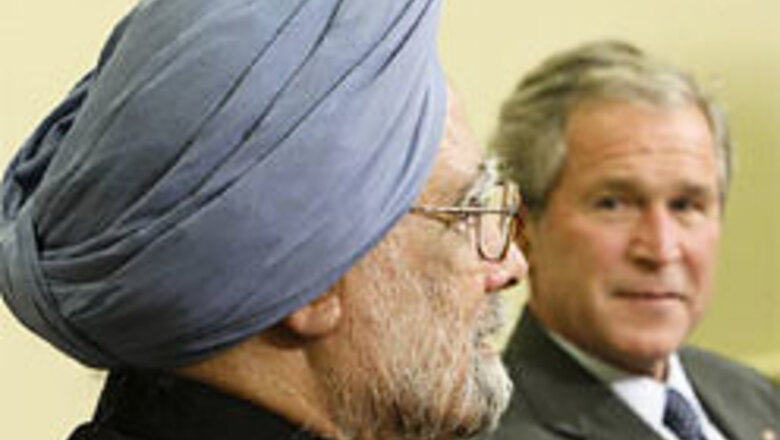
views
Washington:The US Congress on Wednesday (Thursday in India) approved a landmark deal ending the three-decade ban on US nuclear trade with India, handing a victory to President George W Bush on one of his top foreign policy priorities.
What is the pact? Overturning a 34-year-old ban, it allows the Asian power access to US civil nuclear fuel and technology although it has never signed the Non-Proliferation Treaty, conducted nuclear tests in 1974 and 1998, and has not ruled out doing more.
Under the amendment, India must separate its civil and military nuclear facilities, and submit civil facilities to inspections by the International Atomic Energy Agency.
The agreement means other countries can sell India nuclear technology and fuel. France signed such a deal this week.
Why is it controversial?
Critics say it undermines the NPT, membership of which has long been the guideline for the 45-nation Nuclear Suppliers Group (NSG) export cartel to provide civilian nuclear assistance.
Critics also say it undercuts Washington's efforts to curtail Iran's nuclear programme and opens the way for a potential arms race in South Asia between India and Pakistan.
India says 14 of its 22 nuclear facilities are civilian. The pact could make bomb-making easier at the other eight, as civilian nuclear fuel needs will be met by the United States.
Who will benefit?
US and European companies that supply nuclear technology and help build reactors.
The deal could open up around $27 billion in investment in 18-20 nuclear plants over the next 15 years, according to Confederation of Indian Industry.
By 2030, the economic benefits that will accrue to India's economy as a result of nuclear trade could touch $500 billion, says Imagindia Institute, an Indian lobby group.
India: It becomes a de facto nuclear power. New Delhi even says it still can test nuclear weapons if it needs to, although a waiver of NSG rules adopted to allow trade with India indicates this would be cut off if India tested again.
India's economy: It relies on imported oil for some 70 per cent of its energy needs and the government says nuclear power will help feed its rapidly expanding economy.
USA:The deal will mean deeper ties between Washington and Delhi just as India starts to embrace the West. It is not just about friendship - the US, for example, may now have a better chance of winning a $10 billion fighter deal from India, the world's biggest arms contract.
Who won't benefit?
Pakistan: India's nuclear rival, has sought a similar deal with Washington but was refused because of a poor non-proliferation record. As a result, Islamabad has talked of expanding nuclear cooperation with China. Pakistan has not signed the NPT.
China: Some analysts see the India deal as part of attempts by the United States to counterbalance China's influence in Asia.
The environment: The deal will still have a minimal impact on India's power industry. Dirty coal-fired power stations and hydroelectric dams will continue to account for the lion's share of its power generation.
Is the deal popular in india? Polls show most Indians are far more worried about the economy and inflation than some abstract nuclear deal.
Left parties withdrew their support for the Congress-led government over the deal, saying it made India a pawn of Washington. Opposition parties led by the BJP also oppose the deal, saying it limits India's ability to test nuclear weapons.
Nevertheless, the deal is seen as one of Prime Minister Manmohan Singh's biggest achievements in four years in power.



















Comments
0 comment